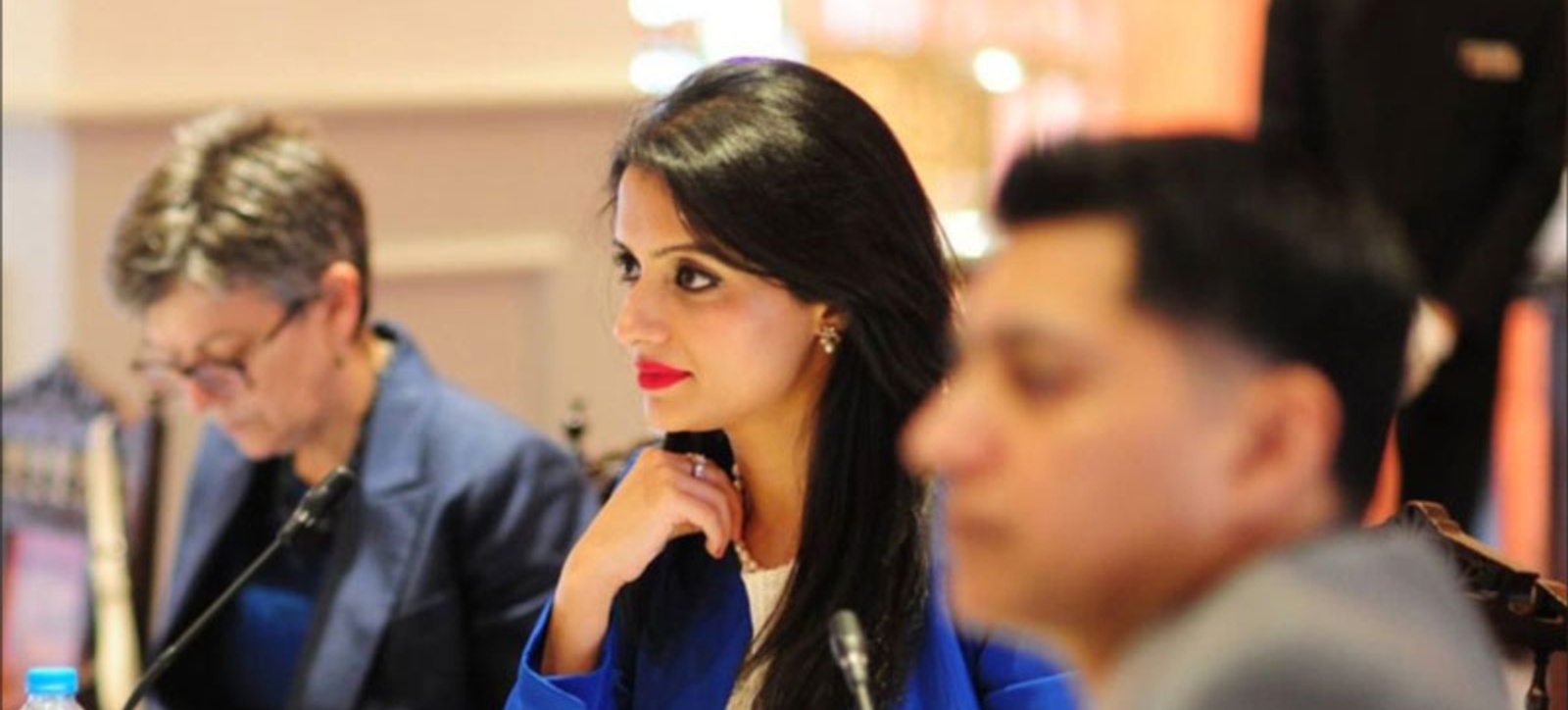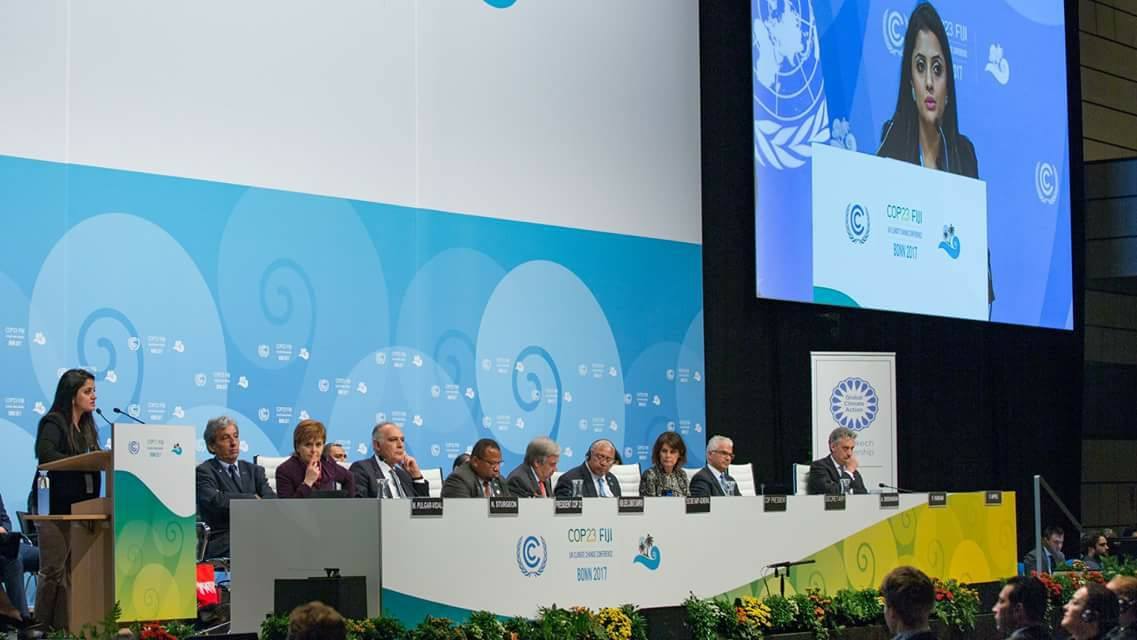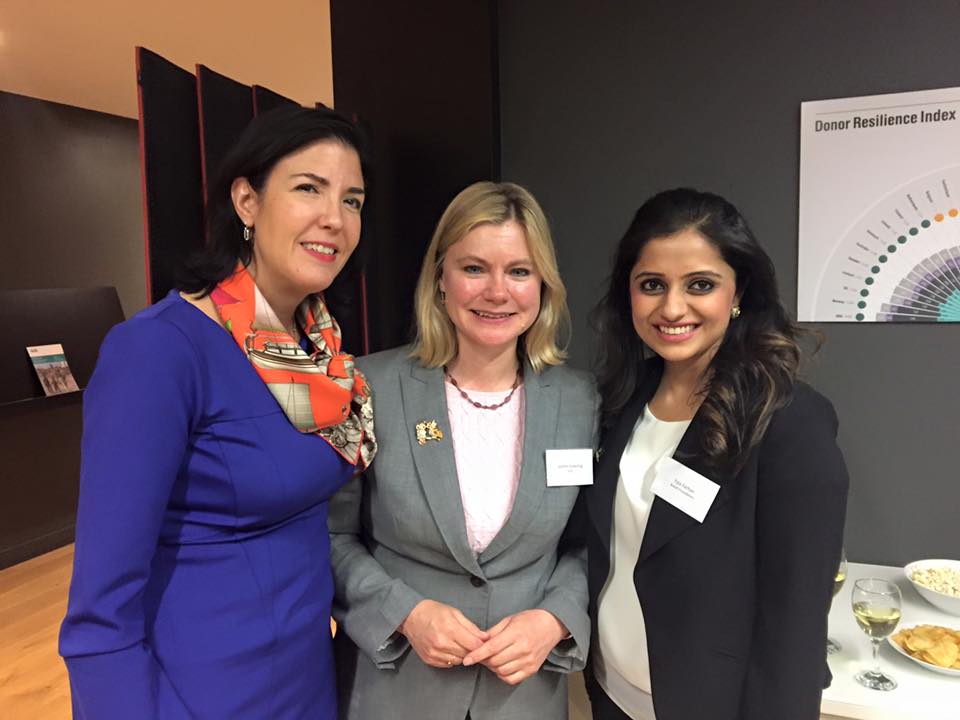
- UN Secretary General made Fiza Farhan its youngest advisor at 28
- Her social enterprise was singled out by UN as best practice
- The 32 year-old has championed women's rights all over the globe
- She is now tackling the world's biggest societal issues
Fiza Farhan has always been a rebel. Growing up the daughter of a Pakistan Naval officer Fiza was expected to find a nice young man, get married and settle down to a life of calm domesticity.
But when her parents found that nice young man, Fiza, who had always been labelled the ‘difficult child’ refused to marry him. Instead, she persuaded her father to allow her to be the first woman in her family to head abroad to further her education at Warwick Business School by studying MSc Management.
It would not be the first time that Fiza stood up to the patriarchal system in her own country and around the world – she has been doing it her whole career.
In a male-dominated country, Fiza co-founded a social enterprise, has stepped into numerous all-male boardrooms and taken head-on the view that women should take a back seat and play the dutiful wife. She has changed not just her father’s perception, but is intent on dismantling a worldview that women should be demure around men.
Fiza was appointed to the UN Secretary General’s first High Level Panel on Women’s Economic Empowerment in 2016 and is now advising Governments, private sector and development organisations around the world on how to break fragile glass ceilings in society and release women from the shackles of male servitude.
“This is a cause close to my heart,” says Fiza, who is now happily married. “As a woman I have had to confront the male-dominated business world and the biases and barriers that constructs so many times.
“It is very challenging and there were times where I doubted myself, but I look at how far I have come now, from that scared and bewildered girl who left Pakistan to seek her dreams and find a purpose in the UK, to the confident and empowered woman I am now, and I truly believe there are many more women who can do this, who can realise their dreams and find fulfilment.”
Fiza’s rebellious streak has helped her take on challenges that others have shied away from, such as tackling the problems of rural poverty in Pakistan. Immediately after graduation from Warwick Business School, Fiza co-founded Buksh Energy and Buksh Foundation, her two social enterprises where innovations like the 'Lighting a Million Lives' project evolved from thoughts on a chart to becoming UN Foundation/UN Habitat certified International Best Practice. The project used microfinance to help villagers replace widely-used, but dangerous and polluting kerosene lamps, with safer solar versions.

Her near-decade long work with both her social enterprises was based on one mantra; “from problems to solutions”, whereby Fiza and her team would relentlessly identify the top development challenges Pakistan faced and strategize the most sustainable solutions for them, connecting all the relevant stakeholders in multi-sectorial partnerships.
The hard work and dedication saw Fiza named as one of Forbes' 30 under 30 Social Entrepreneurs in 2015 and then again in Forbes Asia in 2016 enabling her to become the youngest advisor to the UN Secretary General when she joined the High Level Panel on Women’s Economic Empowerment at just 28.
She says: “It was such an honour to be asked to join the UN panel. It came out of the blue and I was amazed when I saw my name on the panel, which I had to work closely with for two years. The panel also included the President of Costa Rica, Jim Yong Kim, the World Bank Group President, Justine Greening, International Secretary of State for the UK, Phumzile Ngauka Mlambo, UN Women Executive Director, Guy Ryder, Director General of the International Labour Organization, and Christine Lagarde, who was Managing Director of the International Monetary Fund at the time, among others. I was quite daunted to be in such company, but it was a great experience and has really opened so many doors for me.”
She was also appointed an advisor to the Chief Minister of Punjab, governing Pakistan’s most populous region of more than 110 million people, where Fiza worked with Shahbaz Sharif as Chairperson of his Task Force on Women Empowerment. It saw Fiza move from practitioner on the ground to advisor and policymaker on both a national and global scale.
“At the foundation we wanted to help those most in need in Pakistan stand on their own two feet,” says Fiza. “But as an independent strategic advisor to multiple Governments, UN agencies, development organisations and private sector companies I have worked on development agendas that align with my passion, expertise and experience. These include women empowerment, climate change, sustainable economic growth, youth and most importantly 'win-win' multi-sectorial partnerships.”
Reaching gender equality by 2030 is one of the UN’s Sustainable Development Goals and Fiza is at the forefront of making it happen, embedding the agenda with other key development challenges like climate change, youth development and sustainable livelihoods for the poor.

Across the world, only one in two women aged 15 and over are in paid employment compared with roughly three in four men. At the same time, women take on about three times more unpaid work than men. While hundreds of millions of women work informally without social and labour protection. In India, for example, some 120 million women (around 95 per cent of women in paid work) work informally with no rights, as do around 12 million women in Mexico (around 60 per cent).
“To tackle this deep-rooted problem will take private and public enterprises coming together along with Governments,” says Fiza.
“We need to challenge the social norms that hold women back and promote positive role models. Governments need to bring in the legislation and protections for women to break the burden of unpaid work. In many developing nations women are excluded from the financial system by prejudices and laws, and are not part of the digital network. This can be addressed with legal reforms and innovations like M-Pesa, the mobile payment system that is used by millions in Kenya.
“Business culture needs to change to give women equal pay, see discriminatory practices and biases eliminated and women promoted to leadership positions. Governments need to set an example here, for business to follow, and change the procurement practices to reward suppliers and companies that have or are working towards gender equality. It has been established with research that those companies with more women in senior management and board positions outperform companies with poorer gender ratios with higher rate of returns and 26 per cent higher profits.
"My mission is to enable the world to understand that investing in women and establishing a gender balance workforce is not only the right thing to do but also the smart thing to do as it adds directly to profitability and makes business sense.
“It is a huge task, but I am determined that this goal is reached and I am working tirelessly round the world to achieve it.”
Fiza’s involvement with the UN has seen her become a global advisor to countries and institutions looking to break the societal shackles holding women back in places as far afield as Japan, Australia and Thailand.
“The development issues I am so passionate about require advocacy, awareness, inspiration and mentoring, especially for the young girls and women of Pakistan and the region,” says Fiza.

Plus, she continues to advise companies and organisations on social entrepreneurship and green energy projects, working with UNICEF, the United Nations Development Programme, Oxfam, the United States Agency for International Development, British Asian Trust UK, the Economic Dividends for Gender Equality in Switzerland, while she is also part of the World Energy Council.
In 2019, Fiza also collaborated with the Australian Sex Discrimination Minister to launch the 'Male Champions of Change' project in Pakistan, enabling the first international group to join the programme that sees leading male CEOs commit to gender equality and has 235 CEO’s in the network in Australia.
These are just some of the many and diverse advisory 'hats' Fiza continues to wear. It is an exhausting list that sees Fiza criss-crossing the globe - and all the while she is bringing up her 18-month-old child.
“I have always wanted to create change, to bring real change,” says Fiza. “That year at Warwick opened my eyes to the possibilities of social enterprise and entrepreneurship; it ignited my passion for engineering social justice and to bring about change for the many in dire poverty in Pakistan and across the world. It gave me the tools and insight to realise that responsible business can bring about this change.
“I have had to face my fears, walk into so many rooms full of men, make mistakes, fall down and get back up again, but with determination I have continued and now have confidence that I can succeed in almost any venture. I represent Pakistan with pride wherever I go and I hope to inspire other women to break free from inequality and identify their innate passion and potential.
“I know at least I have had an impact on my family. Once the glass ceiling was broken, all the female cousins after me, now want to go abroad to study rather than settle down and marry!”
For more articles like this sign up to Core Insights here.




 X
X Facebook
Facebook LinkedIn
LinkedIn YouTube
YouTube Instagram
Instagram Tiktok
Tiktok